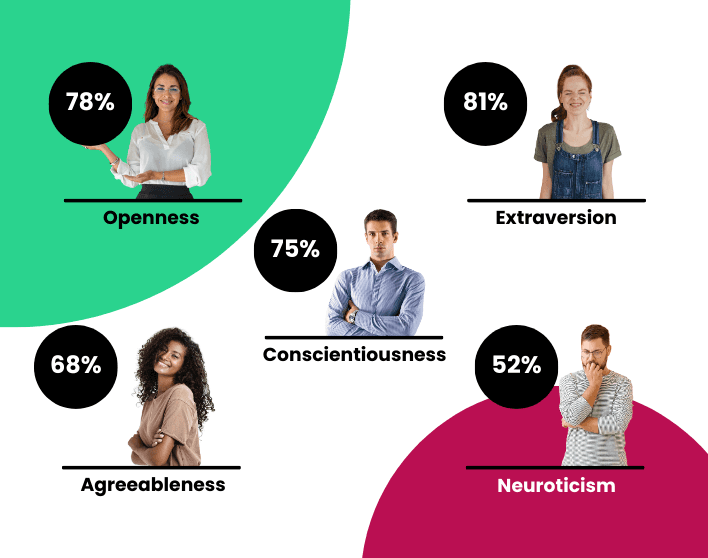The Bryq Team
HR Experts
The retail industry faces distinct challenges in workforce management, particularly in attracting, recruiting, and retaining skilled workers. In an increasingly competitive landscape, leveraging data-driven strategies is essential to address these challenges and redefine how retail organizations achieve long-term success. High employee turnover, a prevalent issue in this sector, destabilizes the workforce and incurs substantial costs from the ongoing need for hiring and training new staff.
Understanding the Core Importance of Employee Engagement in Retail
Employee engagement in retail is crucial for maintaining a productive workforce and enhancing customer service and in-store experiences (Bakare, 2018). Engaged employees provide better customer interactions, increasing customer loyalty and sales. Through systematic employee behavior and feedback analysis, retailers can deploy data-driven strategies that tailor management practices to boost employee satisfaction and customer service quality. This approach refines day-to-day operations and enhances the customer experience, demonstrating the intrinsic link between engaged employees and business performance.
Leveraging Analytics for Enhanced Retail Employee Engagement
Advanced analytics are a cornerstone for strategic workforce management in the competitive retail industry. Retailers can more effectively manage their teams by evaluating employee performance, understanding attrition rates, and uncovering the key drivers of job satisfaction. This strategic application of data helps pinpoint issues like high turnover and crafting tailored strategies to mitigate these challenges.
Integrated with tools such as employee feedback platforms and performance management systems, employee recognition programs are crucial in enhancing engagement. Recognizing and valuing employees contribute significantly to their satisfaction and loyalty, which is essential in a sector often viewed as having lower prestige and fewer advancement opportunities (Bakare, 2018; Alex, 2021).
These analytical tools offer actionable insights that assist retail managers in reducing turnover, improving communication, clarifying roles, and fostering a supportive work environment. Such efforts are crucial for boosting overall job satisfaction and creating a more engaged and productive workforce.
Customizing Employee Experience in Retail Through Data Analytics
Utilizing data analytics, retailers can effectively segment their workforce to identify unique needs and preferences, which facilitates the customization of training programs, flexible scheduling, and career development opportunities. This level of personalization boosts employee engagement and addresses the high turnover rates prevalent in the industry.
By tailoring initiatives to the diverse backgrounds and needs of retail employees, these strategies ensure that flexible scheduling and career development are not merely perks but essential elements that enhance employee motivation and satisfaction. These personalized efforts are crucial for motivating retail employees, positively impacting their experience, customer interactions, and overall business performance by recognizing and rewarding their contributions.

Optimizing Productivity and Retention Through Data-Driven Insights
Data-driven insights are vital in developing targeted interventions that substantially impact productivity and retention within the retail sector. Predictive analytics, for example, can forecast potential staff departures, allowing management to take proactive measures to retain top talent—a critical strategy in an industry known for high turnover costs and the loss of valuable customer service expertise. (Bakare, 2018).
These interventions enhance employee engagement, directly correlating with increased productivity and improved retention rates. By leveraging these insights, retail managers can implement effective strategies that keep their best employees engaged and committed to the organization.
Ensuring Ethical Data Use
Navigating the ethical implications of using employee data is crucial for retailers. Ensuring transparency about data collection, use, and protection helps build trust among employees and customers. Adherence to data protection laws is a legal necessity and a vital component of maintaining ethical business practices.
Industry Insights and Bryq and Pinpoint's Contributions
Recent studies underscore the importance of innovative recruitment and retention strategies tailored to the retail environment. To attract and retain skilled workers, the retail industry must improve its image and communicate the career opportunities it offers more effectively. Collaborations with educational institutions and recruiters can help dispel the myths about retail jobs and highlight the industry's potential for career growth and stability (Bakare, 2018).
Bryq’s assessment can significantly enhance the recruitment process by identifying candidates who are skilled and a good cultural fit for the retail environment. This alignment can improve employee satisfaction and retention. Bryq also provides a sophisticated algorithm and a unified assessment to spot service stars, ensuring every recruit resonates with your brand ethos and meets the specific criteria of retail roles, enhancing the overall quality of hires and reducing employee churn.
Detailed features of Bryq’s solutions for retail can be found on the retail solutions page.
Meanwhile, Pinpoint’s Applicant Tracking System (ATS) is specifically designed to meet the unique needs of retail hiring. The system helps retailers attract candidates at scale, efficiently handle high volumes of applications, and quickly filter candidates to identify the best fit for the role. Its talent pooling feature simplifies seasonal hiring by maintaining a ready list of potential hires, ensuring smooth operations during peak periods. Moreover, Pinpoint’s user-friendly design caters to store managers, streamlining the entire hiring process.
You can find more information on all the features built for how retail hires on Pinpoint's website.
Conclusion
In the fast-evolving retail sector, leveraging data-driven strategies for workforce management is essential for meeting today's complex challenges and shaping a sustainable future. These approaches enhance the understanding of employee engagement dynamics and enable predictive insights that reduce turnover and improve recruitment efficacy. The ethical application of data safeguards these advancements, ensuring they align with both legal standards and ethical expectations.
The focus on creating personalized employee experiences is crucial, reflecting a shift towards an employee-centric approach in retail that prioritizes satisfaction and productivity. This strategy improves the workplace environment and boosts customer satisfaction and business performance. Ultimately, embracing these innovative, data-driven methods is key to transforming retail operations and fostering a resilient industry ready to thrive amid ongoing changes.
References
Alex, A. (2021). A Comprehensive Study on Newer Trends in Recruitment Practices With Reference To Retail Industry. VICHAYAN – International Journal of Multidisciplinary Research, Vol I, Issue I.
Bakare, S. (2018). Attracting, Recruiting, and Retaining Skilled Workers in Retail Organizations. International Journal of Social Science and Economic Research, 03(05).









